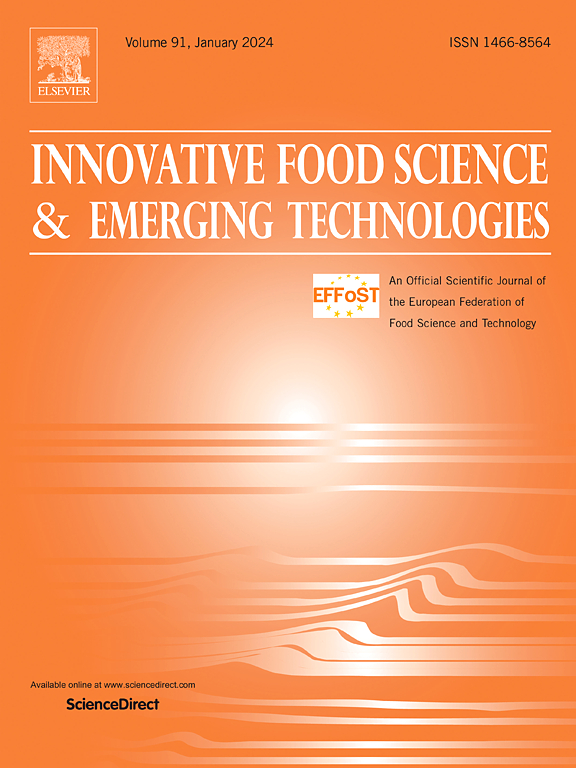Cortex degradation plays a critical role in modulating the pressure resistance of Bacillus spores and their inactivation under high-pressure treatments
IF 6.8
1区 农林科学
Q1 FOOD SCIENCE & TECHNOLOGY
Innovative Food Science & Emerging Technologies
Pub Date : 2025-08-18
DOI:10.1016/j.ifset.2025.104177
引用次数: 0
Abstract
High hydrostatic pressure (HHP) is an emerging non-thermal technology capable of inducing spore germination and inactivation. However, the structural determinants of pressure resistance in germinated spores remain poorly understood. This study investigated the role of cortex degradation and other spore structures in the effectiveness of a germination-inactivation strategy using combined HHP treatments (200 MPa–500 MPa, or 500 MPa–500 MPa). Our results showed that HHP (100 to 500 MPa) induced germination and heat resistance loss in Bacillus subtilis and B. cereus spores. Cortex degradation induced by HHP, primarily mediated by CwlJ, contributed to the loss of pressure resistance and enhanced subsequent 500 MPa inactivation of B. subtilis spores. Incubation at 37 °C following 500 MPa treatment promoted further cortex degradation and enhanced inactivation during subsequent 500 MPa treatment, but this effect was abolished in spores with defective germinant receptors. Furthermore, spore coat defect lowered pressure resistance and improved inactivation in the combined 200 MPa and 500 MPa treatment, whereas deletion of small acid-soluble proteins had no effect. Finally, structural analyses supported that cortex degradation plays a crucial role in inner membrane damage and spore inactivation via HHP. These findings highlight cortex degradation as a key intermediate step in pressure-mediated spore inactivation and provide valuable insights for designing efficient non-thermal sterilization strategies.
在高压条件下芽孢杆菌孢子的抗压性和失活过程中,芽孢杆菌皮层降解起着至关重要的作用
高静水压力(HHP)是一种新兴的非热技术,能够诱导孢子萌发和灭活。然而,发芽孢子抗压性的结构决定因素仍然知之甚少。本研究研究了皮质降解和其他孢子结构在使用HHP联合处理(200 MPa - 500 MPa,或500 MPa - 500 MPa)发芽灭活策略中的作用。结果表明,HHP (100 ~ 500 MPa)可诱导枯草芽孢杆菌和蜡样芽孢杆菌孢子萌发和耐热性丧失。HHP诱导的皮层降解主要由CwlJ介导,导致枯草芽孢杆菌孢子丧失抗压能力,并增强了随后的500 MPa失活。500 MPa处理后37°C的孵育促进了皮层的进一步降解,并在随后的500 MPa处理中增强了失活,但这种影响在萌发受体有缺陷的孢子中被消除。此外,在200 MPa和500 MPa联合处理下,孢子外壳缺陷降低了孢子的耐压性,改善了孢子的失活,而小的酸溶性蛋白的缺失对孢子的失活没有影响。最后,结构分析支持皮层降解通过HHP在细胞膜损伤和孢子失活中起关键作用。这些发现强调了皮层降解是压力介导的孢子失活的关键中间步骤,并为设计有效的非热灭菌策略提供了有价值的见解。
本文章由计算机程序翻译,如有差异,请以英文原文为准。
求助全文
约1分钟内获得全文
求助全文
来源期刊
CiteScore
12.00
自引率
6.10%
发文量
259
审稿时长
25 days
期刊介绍:
Innovative Food Science and Emerging Technologies (IFSET) aims to provide the highest quality original contributions and few, mainly upon invitation, reviews on and highly innovative developments in food science and emerging food process technologies. The significance of the results either for the science community or for industrial R&D groups must be specified. Papers submitted must be of highest scientific quality and only those advancing current scientific knowledge and understanding or with technical relevance will be considered.

 求助内容:
求助内容: 应助结果提醒方式:
应助结果提醒方式:


